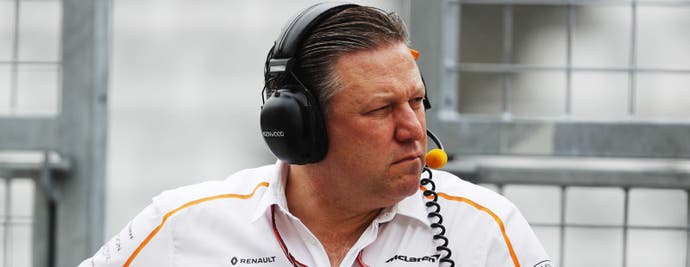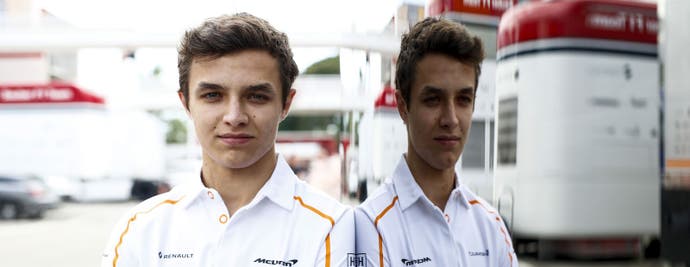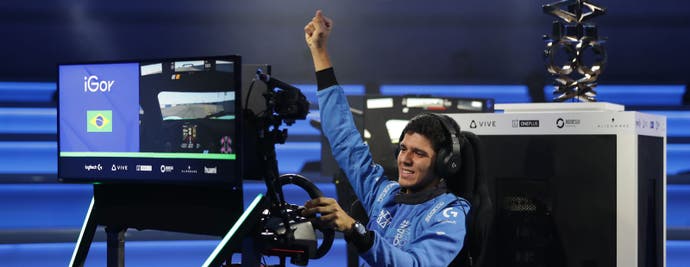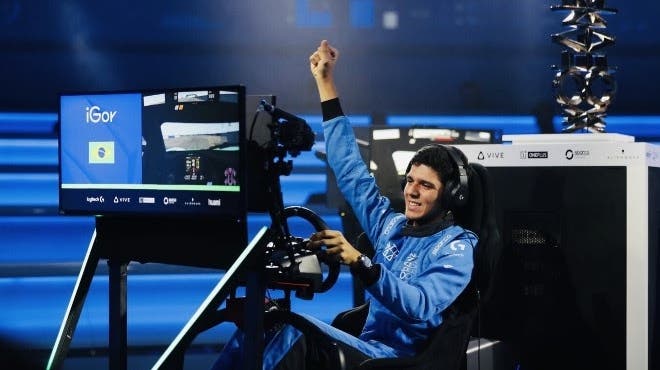Can video games save motorsport?
How an F1 team is turning to esports to find the next Lewis Hamilton.
When I was a kid, I was lucky enough to enjoy a handful of seasons racing karts. For a short while, I thought it might even lead somewhere: my first race, around a featureless corner of a disused air station in Cambridgeshire, saw a class victory (in a class of two, mind, my sole competitor an 8-year-old who, his dad told me, still thought he was Batman in his Batmobile chasing down the Joker when he was behind the wheel).
Even then, by the time my next race came around at Hertfordshire's Rye House I thought I was the real deal, and well on my way to future glory. And I did alright, leading the first half dozen laps of the final until a little kid on his debut sporting a bright red helmet dived past going into the final esses.
Afterwards I went to offer my congratulations on his success, just as his dad was packing up the kart into their beaten-up trailer. I think I might have been slightly patronising. "You'll do okay," I, a veteran of two whole races, said. At least I got that part right.
He ended up doing just fine. Little Lewis Hamilton from Stevenage went on to win five F1 world titles, and there may well be more to come. It's only with the slightest hint of bias that I'd argue he's the best F1 driver there's been in my lifetime.
My own talent ran out well before the money did, but that eventually ran dry too: I had the backing of the indoor kart track I worked at on the Western Avenue stretch of the A40 which helped make ends meet, a bit of cash from a local newspaper for petrol money so that me and my dad could run the Sierra Estate that served as transporter and, with a couple of sleeping bags and the rear seats folded, a makeshift motorhome. But even the humble Hunts Kart Racing Club championship was serious business. The best drivers could afford an engine rebuild and a new set of slicks every weekend, while mine had to last an entire season.
Which is a long, self-indulgent way to say that motorsport is expensive business. Lewis went on to be picked up by the late, great Martin Hines, a karting legend in his own right as well as a renowned talent spotter, before boldly stepping up to McLaren boss Ron Dennis at an awards ceremony and telling him one day he wanted to be racing his cars. Ron said they should get in touch in nine years time to sort something out, but such was Hamilton's talent he was part of the McLaren programme well before then. The rest, of course, is history.
Hamilton didn't just get lucky - a talent that size was always going to find its way through - but the rising costs of grass-roots motorsport has made a story like his all the more unlikely in recent years. Could another kid from a working class background ever make it again in the sport? "When people ask me where the next me is coming from, I say: 'No'" was Hamilton's own verdict last summer. "These kids come from wealthy backgrounds, not from the struggle I came from."
What hope has motorsport got if it's no longer possible to foster a talent like Hamilton - the one contemporary racing driver whose profile transcends that of the sport? Small wonder audience numbers have been dwindling, with F1 ascending even further up its ivory tower as TV coverage in the UK disappears almost fully behind a paywall.
Against that downbeat backdrop, though, there is hope. It's been bubbling along in various places, most recently - and most potently - via an initiative being spearheaded by McLaren, the F1 team that once took a punt on the young Lewis Hamilton. "Historically, the grass roots form of motorsports has been karting, which not everyone could afford," McLaren Racing's CEO Zak Brown tells me. "It's expensive, so other competitive sports - the footballs of the world - have an advantage. In school, you just need a pitch, two cones and a ball and then you're playing."

That's the problem. The solution, which probably shouldn't be too much of a surprise given the website you're reading this on, is video games. "The simulation is now so authentic, unlike 20 years ago when I grew up," says Brown. "Now, we have the ability for esports to be a great entry point to get a steering wheel in the hands of young - and old! - men and women around the world, to get them exposed to driving a race car.
"Esports provides that opportunity around the world in all genders, all ages, all demographics, and therefore will be a great contributor to getting more fans of motorsports around the world. Not only will it develop fans - over time it will develop drivers themselves because of that realism. Right now you ask the current world champion where he started, and he'd say go-karts. In 10 years time, five years time, that answer might be esports."
Brown and McLaren are deadly serious about this. Last year they began their programme in earnest with World's Fastest Gamer, a competition eventually won by the then 25-year-old kitchen sales manager Rudy van Buren who's spent the past year employed as McLaren's official simulator driver, getting to drive Emerson Fittipaldi's championship winning M23 up the hill at Goodwood as part of the deal.
This year's competition - dubbed McLaren Shadow Project - was bigger still, taking in competitors from iRacing, rFactor 2, Forza Motorsport 7, Project Cars 2 and Real Racing 3 towards a final in McLaren's own Technology Centre and behind the wheel of a McLaren 570S GT4 race car. "We've brought in as much realism into the process to decide who the winner is," says Brown. "We're putting them through the same mental and physical preparation as you would a grand prix driver, and ultimately it will be a data-driven decision as to who has won versus some programmes where it's kind of three judges."
This won't be the first programme backed by McLaren to identify promising new talent. Since 1989 it's backed the Autosport BRDC Award, offering a drive in one of its F1 cars to previous winners such as David Coulthard, Jenson Button and Dario Franchitti. McLaren recently announced it's bowing out after 30 years of support - and it's tempting to think that the rise of esports as a proving ground for new talent helped inform that decision.

"That was part of it," says Brown. "The award, which has gone on for 30 years, has been majorly successful, but you do need to adapt to current times, and going the esports route - it's not the exclusive reason why, but it's certainly a factor."
The fact that esports played even the smallest of parts in that decision process gives some indication of how seriously McLaren is taking its new venture, considering it very much part of its wider driver programme. "We have a variety of racing programmes inside McLaren," says Brown. "Of course we've got F1, we've got the Indy 500 project, there's now the cycling team and we have the esports platform. We very much consider esports a proper racing programme, just like F1, just like Indy Car. It's something different, but we have the same desires there - it's about winning, it's about performance."
McLaren isn't necessarily a pioneer when it comes to using video games to find talent. GT Academy, a programme backed by Nissan, broke new ground when it was established in 2008, early winners Lucas Ordóñez and Jann Mardenborough going on to successful careers in the wider world of motorsport. Subsequent winners struggled to find a foothold elsewhere, though, and the programme has quietly petered out.
The eventual winner of Shadow Project is certainly familiar with GT Academy. 20-year-old Brazilian Igor Fraga was good enough to qualify for previous finals of Sony's programme, though at the time was too young to travel to the camp where drivers competed for that coveted Nissan drive. Not that he's been short of success ever since - late last year he won the first ever esports competition certified by the FIA, motorsport's governing body. So fast is Fraga that the only real disappointment of the Shadow Project finals was the lack of competition, with Fraga cruising to victory.

Fraga is quick. Very, very quick. Quick enough, in fact, that he's already had a handy career in real-life motorsports, having raced in Brazilian FF1600 and F3 and last year finishing fourth in USF2000. If the success of a driver with an existing real-life racing career somewhat ruins the neat PR story of the wonderkid plucked from obscurity, it does go some way to legitimising esports as something that can sit alongside the real thing; a place where drivers can hone, express and showcase their talents. Indeed, the new generation of F1 drivers such as Max Verstappen and Lando Norris are already committed sim players - get lucky on a particular night playing iRacing and you'll line up alongside the stars.
For Fraga, success in Shadow Project gives him exposure and opportunities that wouldn't be possible elsewhere. It's a supplement, but a sizeable one - and another way that sim racing helps support his real-world racing. "I come from a humble family," he says. "I don't have much budget, so when I'm racing in real life I practice much less than some drivers - sometimes I don't even practice. I really need to connect quickly to the car, to feel how it's reacting and push to the limit. And I need to adapt really well - if not I'm not going to carry on racing. [Sim racing] helps make me better. In the virtual world, there's no risk of accidents - and practicing the same track, you can see you can use a bit more of the track, or take a different approach, and then you try it in real life and it really works. It really helps."
As the winner of Shadow Project, Fraga's earned a seat on McLaren's esports team and a place in its driver development programme - with duties he'll juggle with his real world racing career which will resume in an as yet undisclosed series this season. For McLaren, they've got another exciting Brazilian on their books, and one who promises great things in the future. Ayrton Senna, that other Brazilian who went on to great things in a McLaren, is unsurprisingly a hero of Fraga's and an inspiration as he sets his sights on an F1 seat. Senna, though, came from a monied background, a world of privilege that helped him on his way in the sport. In Fraga, there's the suggestion another way might be around the corner.
"This new generation, it's a new world," he says. "Right now motorsport is very, very expensive - this can help bring more people into the sport, it's more accessible for everyone. It can make the sport great again."










